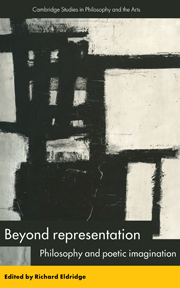Book contents
- Frontmatter
- Contents
- List of contributors
- Editor's acknowledgments
- 1 Introduction: from representation to poiesis
- 2 Confession and forgiveness: Hegel's poetics of action
- 3 The values of articulation: aesthetics after the aesthetic ideology
- 4 In their own voice: philosophical writing and actual experience
- 5 Poetry and truth-conditions
- 6 Fractal contours: chaos and system in the Romantic fragment
- 7 The mind's horizon
- 8 Kant, Hölderlin, and the experience of longing
- 9 Wordsworth and the reception of poetry
- 10 Self-consciousness, social guilt, and Romantic poetry: Coleridge's Ancient Mariner and Wordsworth's Old Pedlar
- 11 Her blood and his mirror: Mary Coleridge, Luce Irigaray, and the female self
- 12 Scene: an exchange of letters
- Index
6 - Fractal contours: chaos and system in the Romantic fragment
Published online by Cambridge University Press: 06 July 2010
- Frontmatter
- Contents
- List of contributors
- Editor's acknowledgments
- 1 Introduction: from representation to poiesis
- 2 Confession and forgiveness: Hegel's poetics of action
- 3 The values of articulation: aesthetics after the aesthetic ideology
- 4 In their own voice: philosophical writing and actual experience
- 5 Poetry and truth-conditions
- 6 Fractal contours: chaos and system in the Romantic fragment
- 7 The mind's horizon
- 8 Kant, Hölderlin, and the experience of longing
- 9 Wordsworth and the reception of poetry
- 10 Self-consciousness, social guilt, and Romantic poetry: Coleridge's Ancient Mariner and Wordsworth's Old Pedlar
- 11 Her blood and his mirror: Mary Coleridge, Luce Irigaray, and the female self
- 12 Scene: an exchange of letters
- Index
Summary
Ist nicht System die Form der Wissenschaft Chaos der Stoff? (Is it not the case that system constitutes the form of knowledge [and] chaos its material?)
Friedrich Schlegel, Philosophische LehrjahreWhere chaos begins, classical science stops. For as long as the world has had physicists inquiring into the laws of nature, it had suffered a special ignorance about disorder in the atmosphere, in the turbulent sea, in the fluctuations of wildlife populations, in the oscillations of the heart and the brain. The irregular side of nature, the discontinuous and erratic side – these have been puzzles to science, or worse, monstrosities.
James Gleick, Chaos: Making a New ScienceAs a visual and conceptual metaphor, chaos represents a recurrent term in the critical writings of early German Romantics. Both Friedrich Schlegel and Novalis (Friedrich von Hardenberg), two prominent theorists of German Romanticism, define chaos as the condition for the possibility of all knowledge. Like a mirror-image that is neither essence nor representation, but an intangible and elusive form suspended in-between, a form necessary for self-(re)- cognition, chaos is an uncontainable and unrepresentable presence that is a precondition of any form of human cognition. Schlegel speculates that chaos may be the first, unconditional principle of system construction, a possible nickname for Fichte's “Ich” (self): “Self [Ich] and not-self [Nicht-Ich] perhaps identical with chaos and system and with spirit and letter.” In other words, chaos designates a higher metaphysics, an originary consciousness prior to systematic thought. In Schlegel's analogic formula, then, chaos corresponds to the first proposition of Fichte's analytic philosophy. As an absolute (spirit), chaos is unrepresentable and suprasensible.
Information
- Type
- Chapter
- Information
- Beyond RepresentationPhilosophy and Poetic Imagination, pp. 133 - 150Publisher: Cambridge University PressPrint publication year: 1996
